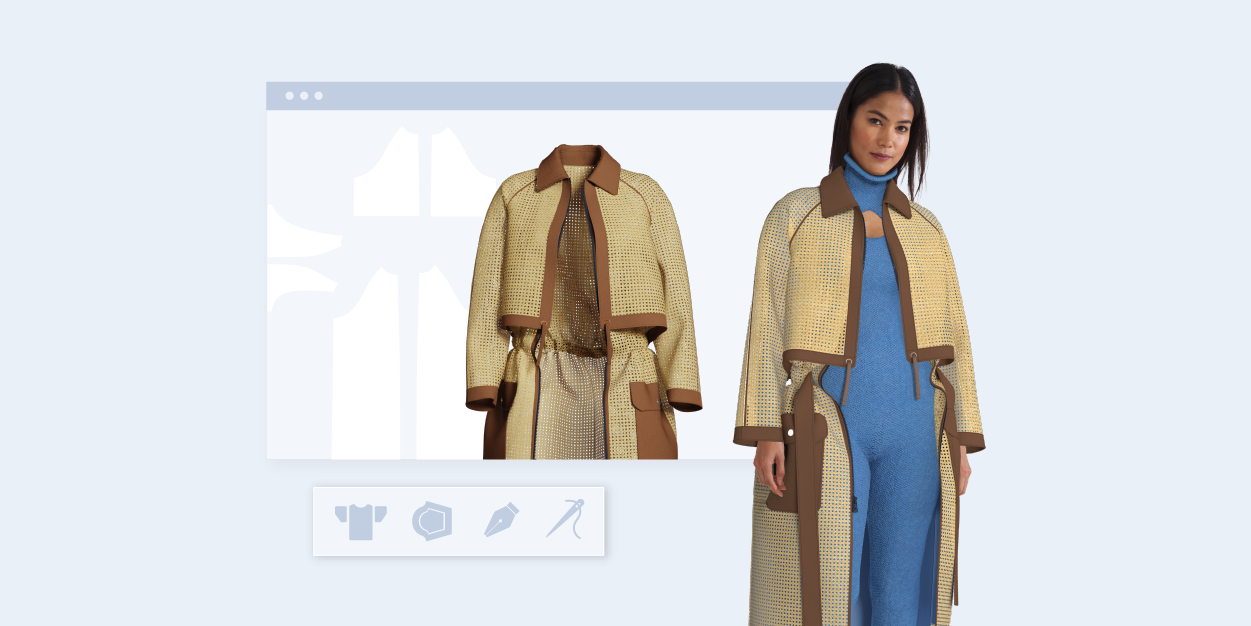Faster Design-to-Production for Intimates Using Virtual Prototyping
Discover how virtual prototyping helps intimate apparel brands cut costs, reduce returns, and speed time-to-market with accurate digital design tools.
January 7, 2025

In fashion, digital and virtual twins are transforming how garments are designed, produced, and presented. While they might sound similar, they serve different purposes. Let's discuss the difference.
In fashion, a digital twin is a virtual representation of a garment used for design, prototyping, and production planning. While highly functional, it primarily focuses on technical accuracy and workflow integration. A virtual twin, however, takes realism to the next level by replicating not just the garment’s shape and construction but also its fabric properties, textures, drape, and interaction with lighting and movement.
This advanced level of accuracy makes it a powerful tool for fit testing, allowing brands to evaluate how a garment will conform to different body shapes and movement scenarios before production. By identifying potential fit issues early in the development process, virtual twins help designers refine patterns and construction details, ultimately improving the quality and precision of the final garment. Beyond design, this high-fidelity visualization is also great for marketing, e-commerce, and consumer-facing applications, where hyper-realistic garment presentation plays a crucial role in engagement and conversion.
While both digital and virtual twins are pivotal in transforming the fashion industry, their primary functions and applications differ significantly:
| Aspect | Digital Twin | Virtual Twin |
|---|---|---|
| Functionality |
A static or semi-interactive digital representation used primarily for visualization and virtual prototyping. |
A highly detailed, interactive digital replica of a garment that allows for real-time adjustments and enhanced design accuracy. |
|
Data Integration |
Limited connection to production data; mainly used for initial design validation and digital sampling. |
Connected to live production and material data, enabling smarter decision-making and improved workflow efficiency. |
|
Scalability & Flexibility |
Less flexible, often limited to specific applications and requiring manual adjustments for broader use. |
Easily scalable across multiple product categories and adaptable to different design and production needs. |
| Business Impact |
Supports early-stage product visualization but lacks the depth to drive real-time decision-making in manufacturing. |
Optimizes supply chain, enhances collaboration between teams, and reduces time-to-market while ensuring quality control. |
In essence, a virtual twin is a highly detailed, interactive digital replica of a garment that allows for real-time adjustments and enhanced design accuracy. Connected to live production and material data, it enables smarter decision-making and more efficient workflows.
Its scalability allows brands to apply it across multiple product categories while adapting to different design and production needs. By optimizing the supply chain, improving collaboration, and reducing time-to-market, a virtual twin enhances quality control and drives overall business efficiency.
In the fashion industry, virtual twins are used to create products in the digital environment before a physical replica is produced. This allows designers and manufacturers iterate on styles, test the fit and look faster than traditional methods. Resulting in less waste, better collaboration, faster time to market, and higher quality of products.
Fashion brands and apparel companies utilize digital product development software to create a virtual twins by building detailed virtual models of garments. This involves developing digital patterns, applying various fabrics and textures, grading multiple sizes, and simulating how it drapes and fits on virtual avatars.
Digital product development software allows designers to make real-time adjustments and visualize multiple design iterations quickly, speeding up the prototyping process. Virtual twins also enable virtual try-ons and customization for customers, providing high-quality visuals for marketing and presentations.

To implement digital twins in your apparel development process, follow these steps:
Identify Business Goals: Determine the specific objectives you aim to achieve with a virtual twin to ensure the technology effectively addresses your needs. Whether it is improving fit, reducing return rates or increasing customer satisfaction.
Gather and Analyze Data: Collect and review relevant data from existing systems to identify areas for improvement where a virtual twin can be beneficial. For example, collaboration between teams and suppliers.
Define Use Cases: Establish various scenarios where a virtual twin can add value, such as fit prediction, operational optimization, or virtual simulations.
Choose the Right Technology: Select the appropriate platform and tools needed to implement and support your virtual twin. Ideally the platform that easily integrates with your current systems.
Develop a Strategy: Create a detailed plan for deploying and maintaining the digital twin, including setting clear goals, timelines, and budgets.
Train Staff: Invest in professional training to ensure your team can use digital twin technology effectively and efficiently.
By following these steps, you’ll ensure a strategic and effective implementation of virtual twins in your apparel development process.
Discover how virtual prototyping helps intimate apparel brands cut costs, reduce returns, and speed time-to-market with accurate digital design tools.
Discover how augmented reality (AR) and virtual reality (VR) are transforming the fashion industry, from virtual try-ons to immersive shopping...
Discover how HCMUTE uses Browzwear 3D technology to enhance fashion education and student creativity in designing traditional Vietnamese costumes.